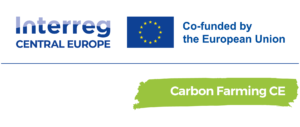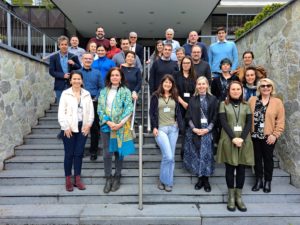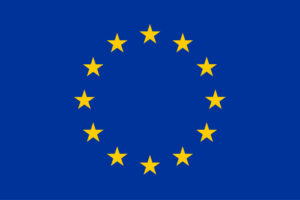Carbon Farming CE

Development of Carbon Farming in the Central Europe
CE 0100255
Project Summary
The agricultural sector accounts for cca. 10 % Central Europe‘s total greenhouse gas emissions (GHG). Through improved agricultural management, called »carbon farming«, farmers can remove carbon dioxide (CO2) from the atmosphere and store it sustainably in the soil in the form of Soil Organic Carbon (SOC). By appropriate management more carbon can be kept in soils than is released back into the atmosphere through organic matter decomposition. Carbon farming not only contributes to reducing GHG emissions, but it preserves and restores soil health through the increase of soil organic matter thus contributing to enhanced food production, resilience, security and biodiversity. Even if EU Green Deal has singled out carbon farming as a key for achievement of EU climate goals, the carbon farming is still in the early stage of development and relatively unknown in CE.
The eleven consortium partners in the project will elaborate and test six different carbon farming techniques and five business models in all participating countries and beyond, facilitating uptake and upscaling through the Carbon Farming Techniques Guide, the Carbon Farming Business Model Procedures and carbon sequestration monitoring roadmaps. The Central European Carbon Farming Cluster will accelerate policy recognition, using the strategy and action plan also developed under the project. Capacity building activities such as a three-day winter school and transnational seminars will complement the project’s portfolio of outputs and provide broad impact in terms of better understanding of the benefits of carbon farming by different stakeholders, wider acceptance of carbon farming practices and business models, and newly developed monitoring models.
Kickoff-Meeting on 14 April 2023

Successful launch of the Carbon Farming CE project
Carbon Farming KoM Press Release Final
Project duration: April 2023 – March 2026
Project Partners
Kmetijski inštitut Slovenije / Agricultural Institute of Slovenia (SI, Lead partner)
Zavod za Trajnostni Razvoj / Institute for Sustainable Development (SI)
GAK Oktatási és Üzemeltetési Nonprofit Közhasznú Korlátolt Felelősségű Társaság GAK / Education and Maintenance Nonprofit Public Benefit Limited Liability Company (HU)
Ri.Nova Società Cooperativa (IT)
Instytut uprawy navozenia i gleboznawstwa – Panstwowy Instytut Badawczy /
Institute of Soil Science and Plant Cultivation Research State Institute (PL)
Bio Forschung Austria (AT)
Obcianske zdruzenie No Gravity / Citizens‘ Association No Gravity (SK)
Poljoprivredni institut Osijek / Agricultural Institute Osijek (HR)
Università di Bologna, Dipartimento di Scienze e Tecnologie Agro-Alimentari / University of Bologna, Department of Agricultural and Food Sciences (IT)
Öko-Beratungs Gesellschaft mbH (DE)
Zemědělský výzkum, spol. s r.o. / Agricultural Research LtD. Troubsko (CZ)
Download
Training guide for carbon farming techniques and their best practice examples
Check out our project website for further information and follow us on Facebook and Twitter.
Project funding
The project is co-funded by the European Union through the European Regional Development Fund in the framework of the Interreg CENTRAL EUROPE programme.



 Deutsch
Deutsch
